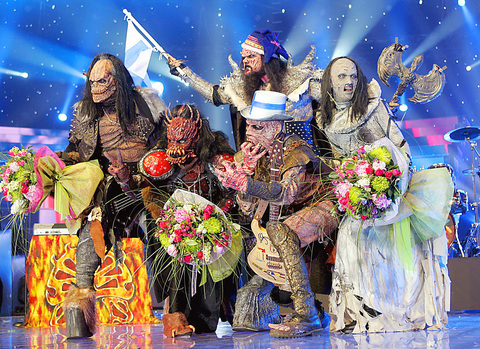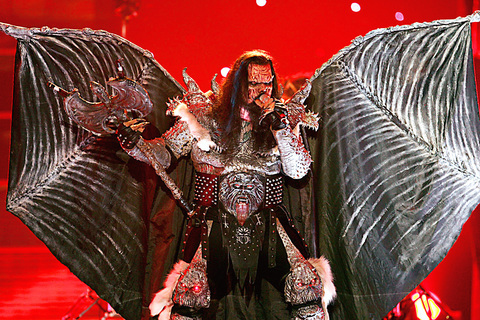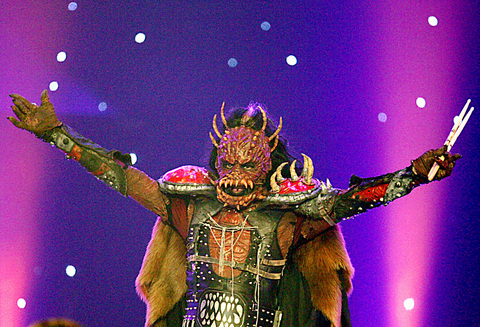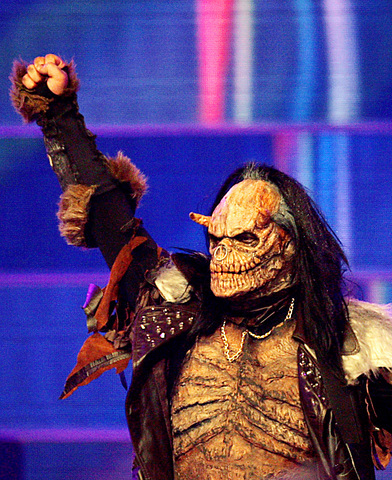Finnish rockers Lordi won the 2006 Eurovision Song Contest late Saturday -- a stunning upset in a
competition better known for bland dance music and bubble-gum pop.
The cartoon metalheads, who sport latex monster masks and spark-spewing instruments and sing about "the Arockalypse," fought off a strong challenge from Russian heartthrob Dima Bilan to take the 51st annual music prize.

PHOTOS: AGENCIES
"This is a victory for rock music ... and also a victory for open-mindedness," lead singer Lordi told a news conference after the win -- Finland's first.
"We are not Satanists. We are not devil-worshippers. This is entertainment," he added.
Bosnia-Herzegovina's Hari Mata Hari was third in the contest, which was decided by phone and text message votes from viewers in 38 European countries.

The phantasmagoric Finns, who scandalized some compatriots when their song Hard Rock Hallelujah was chosen to represent the Nordic nation, was the surprise hit of the competition.
Combining crunchy guitars, a catchy chorus and mock-demonic imagery, Lordi is reminiscent of US 1970s stars KISS -- an acknowledged inspiration of frontman Lordi, who comes from Lapland in Finland's far north.
Band members never appear without their elaborate masks and makeup, and do not reveal their true names.

Lordi beat an unusually eclectic 24-nation field, which ranged from the perky pop of Danish teenager Sidsel Ben Semmane and Malta's Fabrizio Faniello to the balladry of Ireland's Brian Kennedy and the country-pop of Germany's Texas Lightning.
Lordi received 292 points, the highest score in the contest's history. Many Finns were delighted.
"I think it was so great because we are always the losers in Eurovision and now we've got the most points ever in Eurovision history," said Nina Nezeri, 26, who was watching the televised contest at home in Helsinki with a group of friends.

"It's a good song. They look scary and everything but it's a good song."
Greek contestant Anni Vissi, who drew the biggest cheers from the Athens crowd, finished a disappointing ninth.
"It doesn't matter that we lost, we are also winners because Greece put on a great show," Vissi told state-run NET TV. "Those monsters -- I, for one, loved them."
Malta came last, with one point -- but at least it avoided the dreaded "nul points," a mark of Eurovision shame.
Since 1956, Eurovision has pitted European nations against one another in pursuit of pop music glory. Previous winners include 1960s chanteuse Lulu, Sweden's ABBA -- victors in 1974 with Waterloo -- and Canada's Celine Dion, who won for Switzerland in 1988.
Some 13,000 fans from across the continent packed Athens' Olympic arena for the three-hour contest, broadcast live in 38 countries to an audience estimated at 100 million.
Some had come to cheer on their nation's competitor, others to soak in the atmosphere of an event adored by fans of camp and kitsch around the world.
"It's the campiness, the glamour, the glitz, the sparkles. We come every year," said Jude Habib, a communications consultant from London, attending her fourth Eurovision with friend Mandy Norman.
"Our friends think we're mad," she said. "But for one week a year, we can be completely silly."
Eurovision victory is no guarantee of fame. Dion and ABBA went on to glory -- as did Olivia Newton John, who lost to ABBA while competing for Britain in 1974. Other winners have sunk without trace, victims of the "curse of Eurovision."
Athens is hosting the event because Greece won last year in Kiev, Ukraine.
The show opened in true Eurovision style, with a garish musical number inspired, organizers said, by Greece's rich history, mythology and sparkling seas. The hosts, Greek pop singer Sakis Rouvas and American Access Hollywood correspondent Maria Menounous, were flown in from the wings onto a set inspired by an ancient theater.
Broadcaster NBC announced plans earlier this year to replicate the formula -- a forerunner of American Idol-style talent contests -- in the US, with acts from different US states competing for viewers' approval.
The European Broadcasting Union, which runs Eurovision, said it was in talks with NBC over rights. If successful, the American version could go ahead as early as this fall, said the group's director of television, Bjorn Erichsen.

As I finally slid into the warm embrace of the hot, clifftop pool, it was a serene moment of reflection. The sound of the river reflected off the cave walls, the white of our camping lights reflected off the dark, shimmering surface of the water, and I reflected on how fortunate I was to be here. After all, the beautiful walk through narrow canyons that had brought us here had been inaccessible for five years — and will be again soon. The day had started at the Huisun Forest Area (惠蓀林場), at the end of Nantou County Route 80, north and east

Exceptions to the rule are sometimes revealing. For a brief few years, there was an emerging ideological split between the Democratic Progressive Party (DPP) and Chinese Nationalist Party (KMT) that appeared to be pushing the DPP in a direction that would be considered more liberal, and the KMT more conservative. In the previous column, “The KMT-DPP’s bureaucrat-led developmental state” (Dec. 11, page 12), we examined how Taiwan’s democratic system developed, and how both the two main parties largely accepted a similar consensus on how Taiwan should be run domestically and did not split along the left-right lines more familiar in

Specialty sandwiches loaded with the contents of an entire charcuterie board, overflowing with sauces, creams and all manner of creative add-ons, is perhaps one of the biggest global food trends of this year. From London to New York, lines form down the block for mortadella, burrata, pistachio and more stuffed between slices of fresh sourdough, rye or focaccia. To try the trend in Taipei, Munchies Mafia is for sure the spot — could this be the best sandwich in town? Carlos from Spain and Sergio from Mexico opened this spot just seven months ago. The two met working in the

This month the government ordered a one-year block of Xiaohongshu (小紅書) or Rednote, a Chinese social media platform with more than 3 million users in Taiwan. The government pointed to widespread fraud activity on the platform, along with cybersecurity failures. Officials said that they had reached out to the company and asked it to change. However, they received no response. The pro-China parties, the Chinese Nationalist Party (KMT) and Taiwan People’s Party (TPP), immediately swung into action, denouncing the ban as an attack on free speech. This “free speech” claim was then echoed by the People’s Republic of China (PRC),